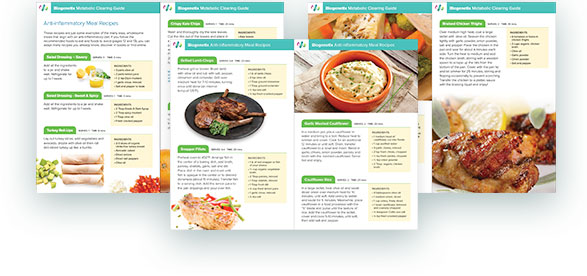A proper diet is essential to the processes of functional medicine. Be sure to eat enough food throughout the day. Talk to your health care provider about your meal portions and schedule, especially if you have specific dietary considerations.
Sample Anti-inflammatory Recipes
Health improvement through lifestyle intervention often relies heavily upon the management of negative systemic inflammation. Anti-inflammatory diets, such as the Paleo diet or the Mediterranean diet can play a large part in progress.
This is a downloadable PDF resource of recipes that are just some examples of the many easy, wholesome meals that align with an anti-inflammatory diet. If you follow the recommended foods to eat and foods to avoid above, you can adapt many recipes you already know, discover in books or find online .
Foods to Eat
These are some nutritional suggestions for an anti-inflammatory diet that can support your journey to better health.
- Some fruits. Examples: blueberries, strawberries, blackberries, lemons, bananas, avocados and apples (avoid dried fruits or fruits high in fructose—consult your provider for specifics)
- Herbal teas
- Vegetables, including celery, carrots, zucchini, cucumbers, beets, eggplant, asparagus, onion, garlic, spinach, lettuce, butternut squash, cauliflower, broccoli, peppers, yams and sweet potatoes
- Beans, including pinto, black, navy, white and red kidney
- Peas (fresh, split or snap)
- Consume mainly fish (no shellfish)
- Moderate amounts of chicken, turkey and lamb
- Use mainly olive oil, coconut oil and avocado oil
- Seeds and nuts, with the exception of peanuts
- Almond butter & cashew butter
- Unsweetened almond or coconut milk
- Turkey bacon and/or sausage patties (nitrite and gluten free)
- Turkey or Chicken lunch meat without additives or preservatives
- Stevia
- Xylitol
- Organic Grade A maple syrup in moderation
- Coconut sugar
Drink Plenty of Water
In general, drinking half your bodyweight in ounces of water is recommended. For specific recommendations, please seek the guidance of your healthcare provider. Lemon or cucumber infused water are acceptable but avoid store-bought water flavoring products.
100 lbs = 50oz. / 6.25 cups / 1.5 liters
120 lbs = 60oz. / 7.5 cups / 1.8 liters
140 lbs = 70oz. / 8.75 cups / 2.0 liters
160 lbs = 80oz. / 10 cups / 2.4 liters
180 lbs = 90oz. / 11.25 cups / 2.7 liters
200 lbs = 100oz. / 12.5 cups / 3 liters
220 lbs = 110oz. / 13.75 cups / 3.3 liters
240 lbs = 120oz. / 15 cups / 3.5 liters
260 lbs = 130oz. / 16.25 cups / 3.8 liters
280 lbs = 140oz. / 17.5 cups / 4.1 liters
300 lbs = 150oz. / 18.75 cups / 4.4 liters
320 lbs = 160oz / 20 cups / 4.7 liters
Foods to Avoid
Here is a list of common foods that can hinder the benefits associated with an anti-inflammatory lifestyle intervention.
- Foods that produce any allergic reaction for you
- Fast food
- Dairy—milk, cheeses, yogurt and butter
- Eggs
- Margarine
- Shortening
- Foods prepared with gluten
- All grains including corn, rice and quinoa
- Tomatoes & tomato sauces
- Corn
- White potatoes
- Peanuts and peanut butter
- Soy
- Products made from soy including soy milk, meat substitutes and tofu
- Beef
- Pork
- Bacon
- Cured meats including cold cuts, hot dogs, canned meat and sausage
- Shellfish
- Honey
- Sugar
- Artificial sweeteners
- Alcohol
- Caffeine including coffee, decaf coffee, black tea and soda or diet soda
- Fruit juices
